The Diabetic Retinopathy Treatment Market is estimated to be valued at USD 5.6 billion in 2025 and is projected to reach USD 11.7 billion by 2035, registering a compound annual growth rate (CAGR) of 7.6% over the forecast period.
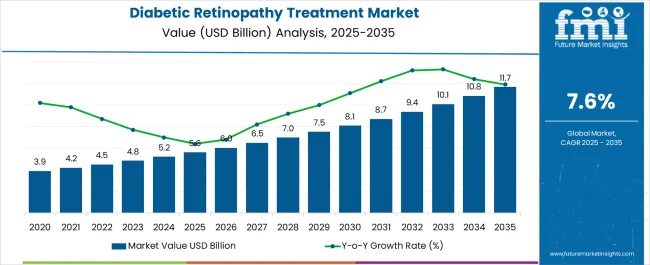
| Metric | Value |
|---|---|
| Diabetic Retinopathy Treatment Market Estimated Value in (2025 E) | USD 5.6 billion |
| Diabetic Retinopathy Treatment Market Forecast Value in (2035 F) | USD 11.7 billion |
| Forecast CAGR (2025 to 2035) | 7.6% |
The diabetic retinopathy treatment market is witnessing accelerated growth, driven by the rising prevalence of diabetes and the associated increase in vision-related complications. Growing awareness of the importance of early diagnosis and intervention, supported by public health initiatives and improved screening programs, is contributing to higher treatment uptake. Advances in pharmacological therapies, laser technologies, and surgical techniques are expanding treatment options, allowing healthcare providers to offer personalized approaches based on disease severity.
Increasing research and development activities are leading to more effective and targeted drugs, particularly those that address the underlying vascular abnormalities causing vision impairment. Strong investments from both government and private organizations in ophthalmic healthcare infrastructure are reinforcing market expansion.
The burden of vision loss on patient quality of life and healthcare systems is creating greater urgency for timely treatment, encouraging adoption of advanced therapeutic interventions As global diabetes incidence continues to rise, the diabetic retinopathy treatment market is expected to see sustained demand growth, supported by continuous innovation and expanding access to ophthalmic care worldwide.
The diabetic retinopathy treatment market is segmented by indication, treatment type, end-user, and geographic regions. By indication, diabetic retinopathy treatment market is divided into Non-Proliferative Diabetic Retinopathy (NPDR) – Moderate, Non-Proliferative Diabetic Retinopathy (NPDR) – Mild, Non-Proliferative Diabetic Retinopathy (NPDR) – Severe, and Proliferative Diabetic Retinopathy (PDR). In terms of treatment type, diabetic retinopathy treatment market is classified into Anti-Vascular Endothelial Growth Factor (VEGF) drug, Intraocular Steroid Injection, Laser Surgery, and Vitrectomy. Based on end-user, diabetic retinopathy treatment market is segmented into Hospitals, Ophthalmic Clinics, and Ambulatory Surgical Centers. Regionally, the diabetic retinopathy treatment industry is classified into North America, Latin America, Western Europe, Eastern Europe, Balkan & Baltic Countries, Russia & Belarus, Central Asia, East Asia, South Asia & Pacific, and the Middle East & Africa.
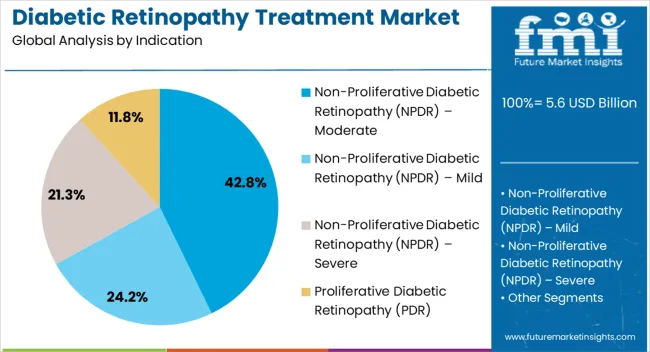
The non-proliferative diabetic retinopathy moderate indication segment is expected to hold 42.8% of the diabetic retinopathy treatment market revenue share in 2025, making it the leading indication. Its dominance is being reinforced by the growing number of patients diagnosed in the early to moderate stages of the disease due to improved screening and awareness initiatives. Treatment at this stage is crucial in preventing progression to severe or proliferative stages, which carry a higher risk of irreversible vision loss.
The increasing adoption of regular eye examinations among diabetic patients, driven by recommendations from healthcare organizations and patient education programs, is facilitating earlier detection. Availability of effective drug therapies and laser interventions tailored for moderate cases has also contributed to greater treatment success rates.
In addition, the rising emphasis on preventive healthcare is encouraging more patients to seek intervention during this stage, further driving the segment’s share As healthcare systems continue to prioritize early management to reduce long-term complications, this segment is expected to remain at the forefront of the market.
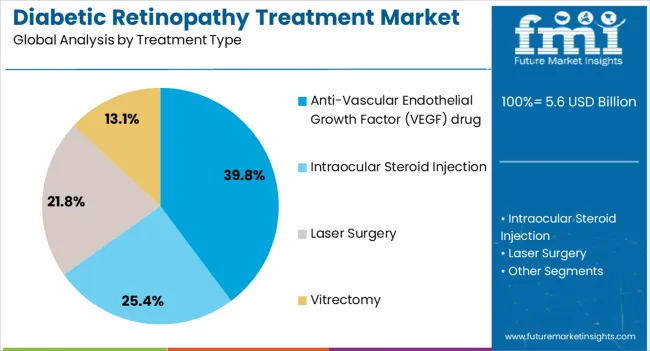
The anti-vascular endothelial growth factor drug treatment type segment is projected to account for 39.8% of the diabetic retinopathy treatment market revenue share in 2025, positioning it as the dominant treatment category. This leadership is supported by the proven ability of these drugs to inhibit abnormal blood vessel growth and reduce macular edema, which are key drivers of vision impairment in diabetic retinopathy. Their effectiveness in stabilizing or improving vision outcomes has made them the standard of care in many healthcare settings.
Continuous innovation and clinical research are resulting in longer-acting formulations, reducing the frequency of injections and improving patient compliance. Growing physician confidence in these therapies, coupled with widespread adoption in both developed and developing healthcare systems, is further accelerating uptake.
Increasing reimbursement coverage and inclusion of anti-VEGF drugs in treatment guidelines have also supported their dominance As patient demand for effective, minimally invasive therapies grows, and newer formulations with enhanced safety and efficacy are introduced, this treatment type is expected to retain its leading position in the market.
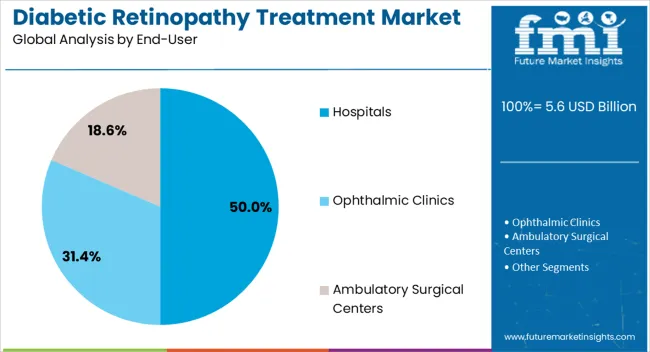
The hospitals end-user segment is anticipated to represent 50.0% of the diabetic retinopathy treatment market revenue share in 2025, making it the leading end-use category. This dominance is being driven by the concentration of advanced ophthalmic facilities, specialized medical expertise, and access to the latest treatment technologies within hospital settings. Patients prefer hospitals for comprehensive diagnostic services, availability of multiple therapeutic options, and the ability to manage complications effectively.
The increasing number of diabetic patients requiring routine monitoring and specialized care has further strengthened hospital-based treatment demand. Large-scale investment in hospital infrastructure, particularly in emerging markets, is expanding access to advanced ophthalmic services. In addition, hospitals often serve as primary centers for clinical trials and the introduction of innovative therapies, which further enhances their role in patient management.
Strong collaborations between pharmaceutical companies and hospital networks are also ensuring rapid adoption of new drugs and treatment devices With hospitals continuing to provide integrated and specialized care, they are expected to remain the leading end-user segment in the diabetic retinopathy treatment market.
Diabetes is a chronic disorder associated with defects in the secretion of insulin from the pancreas or hyperglycemia linked to insulin resistance which ultimately leads to long term multi-organ complications of eye, kidneys, nerves, blood vessels and heart. The most common and severe sight threatening complication of diabetes is Diabetic Retinopathy (DR) with some form of DR present in around 25-33% diabetic persons at any time.
It leads to damaging of the blood vessels present in the retina of the eye. As per WHO estimates, DR contributes around 4.8% of blindness globally. In the US, it is the leading cause of vision loss and new-onset of blindness in working adults. At present diabetes effects 336 million people worldwide which are projected to increase by 54% in 2035 and more than 75% among these diabetic for more than 20 years are likely to have some form of diabetic retinopathy.
Diabetic Retinopathy affects both type 1 and type 2 diabetic patients and with prolific increase in patient pool for both the indication, the market for diabetic retinopathy holds great hopes. As per WHO, 41 percent of the population with diabetes are elderly hence the growing market for diabetic retinopathy can be attributed to expanding geriatric population size.
In addition to this, up-gradation of healthcare infrastructure along with the growing demand for early detection systems are some of the high impact rendering drivers for the DR market. Also the clinical pipeline for DR seems full of promises with lots of drug under umbrella specifically targeting diabetic retinopathy among the diabetic patients.
However, a dearth of skilled ophthalmologist combined with poor primary infrastructure and lack of insurance facilities are restraining the growth of global diabetic retinopathy market.
According to WHO estimates, in 2025, 347 million people were suffering from diabetes globally, of which 11% had diabetic retinopathy. This gigantic population size is expected to increase further with a huge CAGR in coming years. Owing to improved infrastructure and awareness among the people especially of emerging markets like China, India and Brazil, there is strong emphasis on the quality of life (QALY) for diabetic patients demanding early detection and treatment of chronic conditions such as Diabetic Retinopathy, the market seems to be agile and open.
Diabetic Retinopathy triples the chances of vision impairment and is linked to five-fold risk of blindness. However, people suffering from DR can be treated most commonly with laser to prevent visual impairment and blindness. However, there is a need for the development of low-cost, portable and easy to operate laser devices. Thus paying way to address various unmet need in the diabetic retinopathy market which is expected to grow at great pace in the coming 20 years.
Region wise, the global diabetic retinopathy treatment marketis classified into regions namely, North America, Latin America, Western Europe, Eastern Europe, Asia-Pacific, Japan, Middle East and Africa.Among all the geographies, North America dominated the market followed by Europe. The factors attributable for North America is having high obesity rates while Europe has large population of baby boomers.
Asia is expected to show the booming growth in next five years. Within the Asian region, western pacific region account for greater share of blindness due to DR as compared to South-East Asia. The major factor contributing to the rising share of Diabetic Retinopathy among the rising economies are large pool of patients and rising support and funding provided by the government. Under Rest of the World section Brazil is the largest market of diabetic retinopathy.
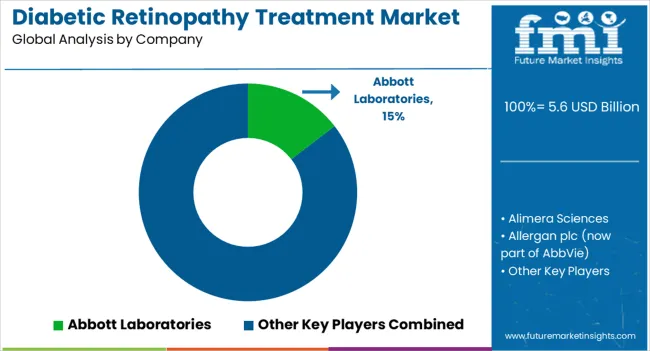
The global Diabetic Retinopathy treatment market is dominated by Bayer AG, Pfizer Inc., Hoffmann-La Roche ltd, Regeneron Pharmaceutical Inc., Novartis AG, Valeant Pharmaceutical International Inc., Abbott Laboratories Inc., Alimera Science Inc., Ampio Pharmaceuticals Inc., etc. Strategic acquisitions, geographic expansion, agreements, new product launches and collaborations are the major adopted strategies by most key players to achieve growth in the global Diabetic Retinopathy.
The research report presents a comprehensive assessment of the market and contains thoughtful insights, facts, historical data, and statistically supported and industry-validated market data. It also contains projections using a suitable set of assumptions and methodologies. The research report provides analysis and information according to categories such as market segments, geographies, type of product and applications.
The report is a compilation of first-hand information, qualitative and quantitative assessment by industry analysts, inputs from industry experts and industry participants across the value chain.
The report provides in-depth analysis of parent market trends, macro-economic indicators and governing factors along with market attractiveness as per segments. The report also maps the qualitative impact of various market factors on market segments and geographies.
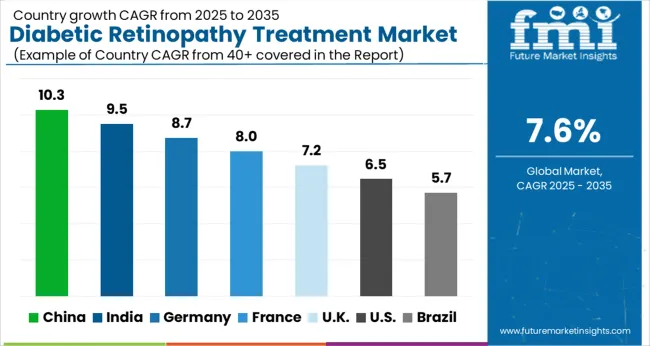
| Country | CAGR |
|---|---|
| China | 10.3% |
| India | 9.5% |
| Germany | 8.7% |
| France | 8.0% |
| UK | 7.2% |
| USA | 6.5% |
| Brazil | 5.7% |
The Diabetic Retinopathy Treatment Market is expected to register a CAGR of 7.6% during the forecast period, exhibiting varied country level momentum. China leads with the highest CAGR of 10.3%, followed by India at 9.5%. Developed markets such as Germany, France, and the UK continue to expand steadily, while the USA is likely to grow at consistent rates. Brazil posts the lowest CAGR at 5.7%, yet still underscores a broadly positive trajectory for the global Diabetic Retinopathy Treatment Market. In 2024, Germany held a dominant revenue in the Western Europe market and is expected to grow with a CAGR of 8.7%. The USA Diabetic Retinopathy Treatment Market is estimated to be valued at USD 2.0 billion in 2025 and is anticipated to reach a valuation of USD 3.7 billion by 2035. Sales are projected to rise at a CAGR of 6.5% over the forecast period between 2025 and 2035. While Japan and South Korea markets are estimated to be valued at USD 304.4 million and USD 156.7 million respectively in 2025.
| Item | Value |
|---|---|
| Quantitative Units | USD 5.6 Billion |
| Indication | Non-Proliferative Diabetic Retinopathy (NPDR) – Moderate, Non-Proliferative Diabetic Retinopathy (NPDR) – Mild, Non-Proliferative Diabetic Retinopathy (NPDR) – Severe, and Proliferative Diabetic Retinopathy (PDR) |
| Treatment Type | Anti-Vascular Endothelial Growth Factor (VEGF) drug, Intraocular Steroid Injection, Laser Surgery, and Vitrectomy |
| End-User | Hospitals, Ophthalmic Clinics, and Ambulatory Surgical Centers |
| Regions Covered | North America, Europe, Asia-Pacific, Latin America, Middle East & Africa |
| Country Covered | United States, Canada, Germany, France, United Kingdom, China, Japan, India, Brazil, South Africa |
| Key Companies Profiled | Abbott Laboratories, Alimera Sciences, Allergan plc (now part of AbbVie), Bayer AG, F. Hoffmann-La Roche Ltd, Genentech, Inc., Novartis AG, Regeneron Pharmaceuticals, Inc., Pfizer Inc., Bausch Health Companies Inc., Johnson & Johnson, and Carl Zeiss Meditec AG |
The global diabetic retinopathy treatment market is estimated to be valued at USD 5.6 billion in 2025.
The market size for the diabetic retinopathy treatment market is projected to reach USD 11.7 billion by 2035.
The diabetic retinopathy treatment market is expected to grow at a 7.6% CAGR between 2025 and 2035.
The key product types in diabetic retinopathy treatment market are non-proliferative diabetic retinopathy (npdr) – moderate, non-proliferative diabetic retinopathy (npdr) – mild, non-proliferative diabetic retinopathy (npdr) – severe and proliferative diabetic retinopathy (pdr).
In terms of treatment type, anti-vascular endothelial growth factor (vegf) drug segment to command 39.8% share in the diabetic retinopathy treatment market in 2025.






Our Research Products

The "Full Research Suite" delivers actionable market intel, deep dives on markets or technologies, so clients act faster, cut risk, and unlock growth.

The Leaderboard benchmarks and ranks top vendors, classifying them as Established Leaders, Leading Challengers, or Disruptors & Challengers.

Locates where complements amplify value and substitutes erode it, forecasting net impact by horizon

We deliver granular, decision-grade intel: market sizing, 5-year forecasts, pricing, adoption, usage, revenue, and operational KPIs—plus competitor tracking, regulation, and value chains—across 60 countries broadly.

Spot the shifts before they hit your P&L. We track inflection points, adoption curves, pricing moves, and ecosystem plays to show where demand is heading, why it is changing, and what to do next across high-growth markets and disruptive tech

Real-time reads of user behavior. We track shifting priorities, perceptions of today’s and next-gen services, and provider experience, then pace how fast tech moves from trial to adoption, blending buyer, consumer, and channel inputs with social signals (#WhySwitch, #UX).

Partner with our analyst team to build a custom report designed around your business priorities. From analysing market trends to assessing competitors or crafting bespoke datasets, we tailor insights to your needs.
Supplier Intelligence
Discovery & Profiling
Capacity & Footprint
Performance & Risk
Compliance & Governance
Commercial Readiness
Who Supplies Whom
Scorecards & Shortlists
Playbooks & Docs
Category Intelligence
Definition & Scope
Demand & Use Cases
Cost Drivers
Market Structure
Supply Chain Map
Trade & Policy
Operating Norms
Deliverables
Buyer Intelligence
Account Basics
Spend & Scope
Procurement Model
Vendor Requirements
Terms & Policies
Entry Strategy
Pain Points & Triggers
Outputs
Pricing Analysis
Benchmarks
Trends
Should-Cost
Indexation
Landed Cost
Commercial Terms
Deliverables
Brand Analysis
Positioning & Value Prop
Share & Presence
Customer Evidence
Go-to-Market
Digital & Reputation
Compliance & Trust
KPIs & Gaps
Outputs
Full Research Suite comprises of:
Market outlook & trends analysis
Interviews & case studies
Strategic recommendations
Vendor profiles & capabilities analysis
5-year forecasts
8 regions and 60+ country-level data splits
Market segment data splits
12 months of continuous data updates
DELIVERED AS:
PDF EXCEL ONLINE
Diabetic Retinopathy Market Analysis - Size, Share & Forecast 2025 to 2035
Diabetic Ketoacidosis Treatment Market Size and Share Forecast Outlook 2025 to 2035
Diabetic Macular Edema Market Forecast and Outlook 2025 to 2035
Diabetic Nephropathy Market Size and Share Forecast Outlook 2025 to 2035
Diabetic Markers Market Size and Share Forecast Outlook 2025 to 2035
Treatment-Resistant Hypertension Management Market Size and Share Forecast Outlook 2025 to 2035
Treatment-Resistant Depression Treatment Market Size and Share Forecast Outlook 2025 to 2035
Diabetic Shoes Market Growth - Trends & Forecast 2025 to 2035
Diabetic Food Market Report – Trends & Innovations 2025-2035
Treatment Pumps Market Insights Growth & Demand Forecast 2025 to 2035
Diabetic Assays Market
Diabetic Pen Cap Market
Pretreatment Coatings Market Size and Share Forecast Outlook 2025 to 2035
Air Treatment Ozone Generator Market Size and Share Forecast Outlook 2025 to 2035
CNS Treatment and Therapy Market Insights - Trends & Growth Forecast 2025 to 2035
Antidiabetics Market Overview - Growth, Demand & Forecast 2024 to 2034
Seed Treatment Materials Market Size and Share Forecast Outlook 2025 to 2035
Acne Treatment Solutions Market Size and Share Forecast Outlook 2025 to 2035
Scar Treatment Market Overview - Growth & Demand Forecast 2025 to 2035
Soil Treatment Chemicals Market

Thank you!
You will receive an email from our Business Development Manager. Please be sure to check your SPAM/JUNK folder too.
Chat With
MaRIA